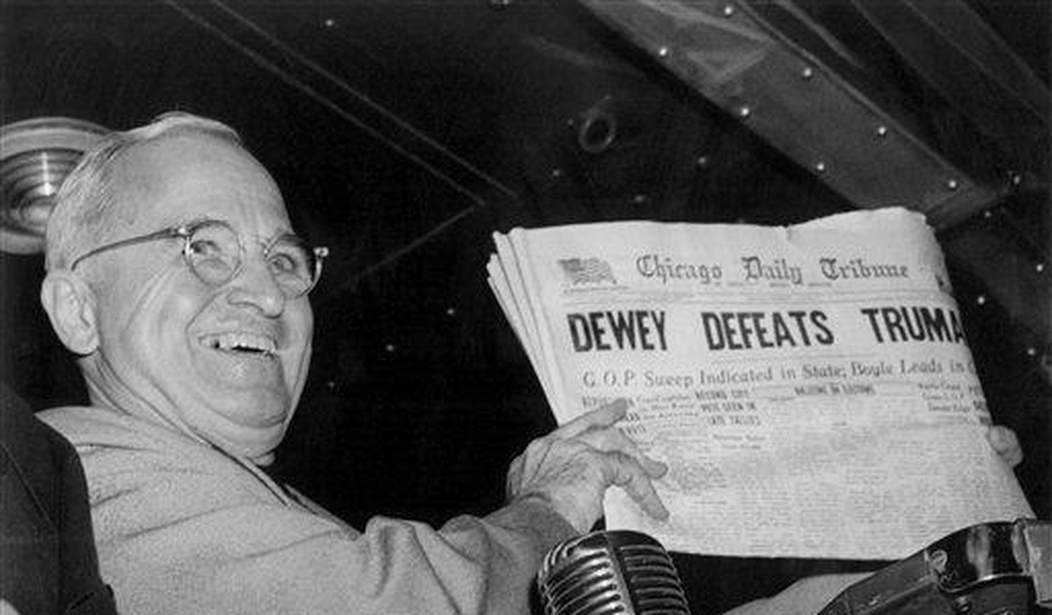In his apocryphal lament, Harry Truman is supposed to have wished for a one-handed economist, one who couldn’t keep advising him “On the other hand…”
But in all fairness to whoever first made that quip — it apparently dates back to the 1930s — that’s the nature of economics.
On the one hand, you can spur growth by printing money and lowering interest rates. On the other hand, inflation will eventually consume the growth. On the one hand, you can hang on to a losing stock, in hopes that it will recover its value. On the other hand, there’s the opportunity cost of holding on to a losing stock when you could sell it and buy a winner. On the one hand, you haven’t taken your wife out to a nice dinner in a while. On the other hand, you’ve been trying to save money to buy her a necklace for your anniversary.
And so it goes: There ain’t no such thing as a free lunch (TANSTAAFL), so every decision comes at a price.
Even more frustrating for our ruling class, economists have a rule explaining that even when they know what they’re doing, they don’t know what they’re doing. It’s called the Law of Unintended Consequences.
The law of unintended consequences, often cited but rarely defined, is that actions of people—and especially of government—always have effects that are unanticipated or unintended. Economists and other social scientists have heeded its power for centuries; for just as long, politicians and popular opinion have largely ignored it.
In other words, even after our political leadership has listened to the experts hemming and hawing over what to do, and then makes the “right” decision, there’s still no telling if the results will match the intentions.
That’s why economics is often referred to as “the dismal science.”
Our problem during the Wuhan Virus pandemic, however, has been something else entirely. Our public health experts seem to all have just one hand each — and zero humility.
Hadley Heath Manning of the Independent Women’s Forum explained “Why Americans Can’t Just ‘Listen to the Experts.’”
She writes that the American Left has been in denial (my word, not hers) about the pandemic, usually retreating to “President Trump is the problem.” But Manning says that “this narrative is too simple and ignores deeper problems,” and correctly notes that “the public health community and the medical establishment have made serious missteps during the pandemic that have earned public distrust.”
Public health experts warned us in February that masks were unnecessary. Now in some places, high school kids who are basically impervious to COVID-19 aren’t allowed to dance cheek-to-cheek.
We were told that we had to stay indoors, stay home from work, close the schools, or everyone was going to die. Then the public health experts decided that getting together in large groups was fine, because BLM signs repel the Wuhan Virus better than masks do, apparently.
Andrew Cuomo ordered nursing homes that they had to take in the infected, right up until he said he’d never given any such order.
The hypocrisy is stunning. So is the anger when reality fails to live up to — or in this case, down to — the experts’ expectations, as Dan Hannan showed in Monday’s Washington Examiner.
Hannan’s piece is headlined, “The better Sweden does on the coronavirus, the angrier they get.”
Here’s why:
The philosopher Karl Popper argued that the defining characteristic of science was that its propositions were falsifiable. But we have somehow reached a place where everything is turned into an argument for more restrictions. If infections rise, we need a tougher lockdown. If they fall, the lockdown is working, so we should keep it.
Sweden got its inevitable COVID-19 deaths out of the way quickly, seems to have established herd immunity or at least approaching it, and never shut down the entire economy. The rest of Scandanavia is catching up on the death totals while having committed economic and psychological self-harm that will take years to repair.
Just like this country has.
Where are our experts now? Fuming, it seems.
Over at Instapundit, Glenn Reynolds has warned repeatedly what this squandering of public trust has cost us and will cost us in the future. “Trust,” he wrote, “is public health’s most important asset, and they squandered it without a thought in the name of expediency.”
There’s an honest beauty about the dismal science. Economists — at least the ones not pushing a political agenda — must approach every problem with humility. Economics has an acknowledgment baked right into its very essence that everything has a price, and that no outcome can be predicted with complete certainty.
Our public health experts, in contrast, have mostly approached each Wuhan Virus question with no humility, complete certainty, and without regard for any costs, economic, social, or personal.
It isn’t that we need better experts. It’s that we need experts who understand the limits of their expertise, and a willingness to apologize and change course when those limits are exposed.










